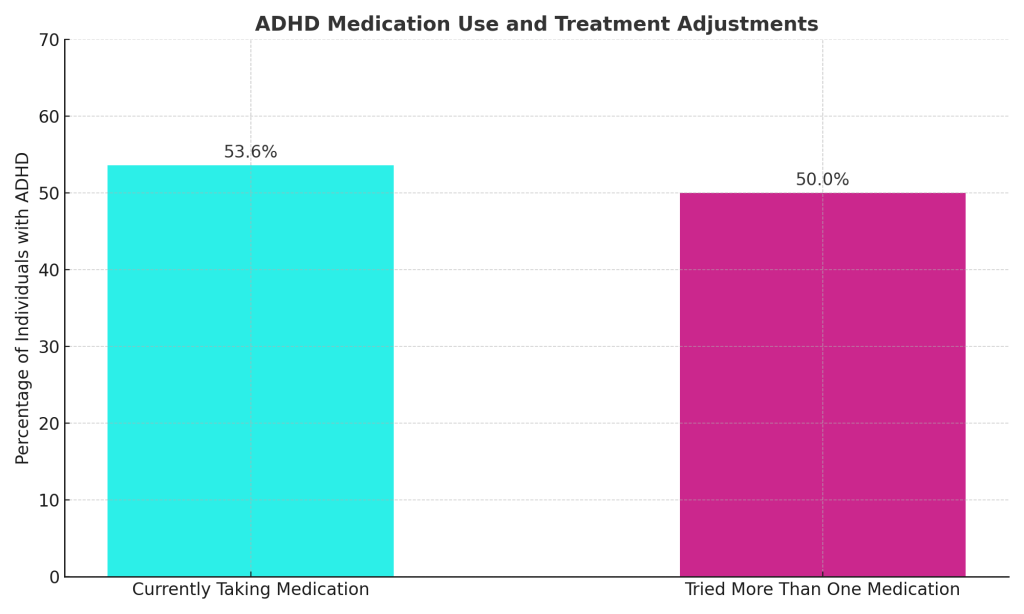
Introduction: The Frustration of Finding the Right ADHD Med
If you or a loved one has ADHD, you probably know what it’s like to cycle through different medications, hoping one will finally stick. For some, the benefits are delayed or minimal. For others, the side effects hit too hard. It often feels like you’re chasing a moving target.
But here’s something that might surprise you. The problem may not be the medication itself. It might be how your body is built to handle it.
Speaking from the lab side, I can tell you this: your DNA plays a much larger role in treatment outcomes than most people realize. Understanding how your body processes ADHD medications can open the door to a more personalized and effective treatment path.
Why Finding the Right ADHD Medication Is So Difficult
Doctors often start with the most commonly prescribed drugs for ADHD, usually from two families: stimulant medications like methylphenidate or amphetamine, and non-stimulants like atomoxetine. The goal is to regulate brain chemicals like dopamine and norepinephrine.
The issue is that these medications don’t affect everyone the same way. In fact, research shows that nearly half of people with ADHD end up trying multiple drugs before landing on something that works.
Up to 50% of individuals with ADHD will need to try more than one medication before they see meaningful results.
— National Institute of Mental Health
This trial-and-error phase isn’t just frustrating. It can delay relief, strain relationships, and leave people questioning the diagnosis itself.
What makes this even more complicated is how each person’s body handles these medications differently. That’s where your genes come into play
.

How Genetic Testing Can Help
Pharmacogenetics is the science of how your genes influence medication response. In our lab, we run detailed tests to understand how your enzymes metabolize common ADHD drugs.
If your body processes a drug too quickly, the medication might leave your system before it can take effect. If your body processes it too slowly, you could experience unwanted side effects like anxiety, fatigue, or irritability.
Testing your DNA provides a clearer picture of which medications are likely to work best for you and which ones to avoid. It’s not magic. It’s biology.
Key Genes That Affect ADHD Medication Response
Here are a few specific markers that we test in the lab:
- CYP2D6: Affects how your body breaks down many non-stimulants, especially atomoxetine
- CES1: Plays a role in metabolizing methylphenidate (found in brands like Ritalin and Concerta)
- SLC6A2: Related to norepinephrine transport, which influences how stimulant meds behave
When these genes behave outside the expected range, standard dosing can become unpredictable. But with pharmacogenetic testing, your provider gets a customized guide to help make more informed decisions.
The Impact on Real People
Many of the samples we process are from people who have been through a long medication journey. Some are children. Some are adults who have been managing ADHD symptoms for years. What they often share in common is exhaustion from trial and error.
Why BloomDNA® Makes This Easier
At BloomDNA®, we take extra care to ensure every test meets clinical standards and is easy for both patients and providers to use. Our process includes:
- Testing across more than 300 medications
- Results you can use for mental and physical health
- A single test with results that stay relevant for life
- A provider-friendly report format that can be added to your care plan
Each test result goes through several levels of lab verification. As someone involved in that review process, I can say confidently that accuracy and reliability guide everything we do.
What to Do Next
If you’ve been struggling to find the right ADHD medication, or you’re considering starting treatment, this kind of testing can save time, reduce guesswork, and make the whole process easier for everyone involved.
It’s one small step that can lead to a more personalized approach to your health.
Talk to your provider about getting a personalized DNA report.
References
Centers for Disease Control and Prevention (CDC)
ADHD Data and Statistics – Children with ADHD Taking Medication
https://www.cdc.gov/adhd/data/index.html
Approximately 53.6% of children aged 2–17 with ADHD are taking medication to manage symptoms.
Centers for Disease Control and Prevention (CDC)
Use of Medications for ADHD Among U.S. Adults
MMWR Weekly Report, Volume 72, Issue 40
https://www.cdc.gov/mmwr/volumes/72/wr/mm7240a1.htm
About 50.4% of U.S. adults with ADHD reported using ADHD medication in the past year.
National Institute of Mental Health (NIMH)
ADHD: Attention-Deficit/Hyperactivity Disorder
https://www.nimh.nih.gov/health/topics/attention-deficit-hyperactivity-disorder-adhd
Up to 50% of individuals with ADHD may need to try more than one medication to find an effective treatment.

